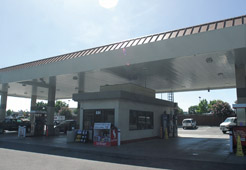
County tobacco youth access survey leads to citation for one
retailer, warning for another
Last week, San Benito County Public Health staff and Mike
Chambless, Hollister’s code enforcement officer, conducted a
tobacco youth access survey of county retailers with the help of
student volunteers.
County tobacco youth access survey leads to citation for one retailer, warning for another
Last week, San Benito County Public Health staff and Mike Chambless, Hollister’s code enforcement officer, conducted a tobacco youth access survey of county retailers with the help of student volunteers.
At the end of the day, after taking minors to all 44 licensed tobacco retailers in the county, one retailer was cited and another issued a warning.
“We are small enough that we can actually survey every store in the county in one day,” said Samela Perez, the public information officer for the San Benito County Health and Human Services Agency’s Public Health Services.
The only store to sell a tobacco product to a minor where money and the product changed hands – a requirement for a citation – was the mini-mart at Safeway Fuel on Airline Hwy. Righetti’s Liquor Store received a warning for ringing up a minor, but a transaction was not completed.
The city ordinance, adopted in October 2006, requires that retailers have a license to sell tobacco, and has strict fines for those who sell to minors.
“The city ordinance places another level of control,” Chambless said. “It controls how it is sold, requires retailers to get a permit.”
Hollister is one of 60 cities or counties in the state that require a tobacco license. The annual fee for a tobacco license is $269. To apply for a tobacco license, the retailer has to submit to a background check and it is denied if they have been convicted for selling tobacco to a minor in the past.
The city ordinance also eliminated sales from mobile retailers, such as booths at street festivals or from vehicles.
The other key component of the city ordinance is that it allows for citation and fines.
The clerk at Safeway Fuel faces a $400 fine, and the mini mart, which has a separate tobacco license from the main Safeway grocery store, could receive a civil penalty of up to $1,000. Safeway Fuel could also have its license revoked, and have all tobacco products removed for up to 10 days. Additional violations can include more civil penalties and up to a five-year revocation of the tobacco license.
Susan Houghton, the director of public affairs for Safeway, stressed that when an employee fails to comply with the laws regarding tobacco sales to a minor it is taken seriously. Local managers did not comment, but referred calls to the public affairs director.
“Employees are trained on it as soon as they are hired,” she said. “Every time we have a violation, we immediately retrain all employees [at the location].”
Houghton said Safeway staff members sign a policy statement that they have been trained on the proper sale of tobacco products when they are first hired, and again if they are retrained. When a violation does occur, it is handled on a case-by-case basis. The employee may be retrained, receive financial repercussions or may be suspended depending on the number of violations.
“This is something Safeway takes very seriously,” Houghton said. “The County [staff who conducted the survey] did the right thing.”
The tobacco survey is conducted at least once a year, but health officials and the code enforcement officer have the right to conduct surveys as often as they want.
“Now that we have problems, the enforcement will be more targeted,” Chambless said.
The year before the ordinance went into effect, 33 percent of tobacco retailers in San Benito County sold to minors in the survey. In three of the last four surveys, the rate came in around 4.5 percent.
“Yes, it is a good deterrent,” Chambless said.
Though the citation is an important part of making the program work, Perez stressed that the Public Health Department is not about being punitive.
“We are about educating people,” she said, “making [San Benito County] a healthier and safer place to live.”
The Public Health Department offers training to retailers about checking IDs for minors, and Perez said it comes in the form of in-person presentations for new staff or even pamphlets that can be slipped in with payroll checks. Those businesses that are interested in training can contact Carlos Lopez, a health education associate II, with Public Health Services, at 637-5367 or ca****@*********co.org.
Lopez said those retailers that did not sell to minors will be receiving a letter of congratulations, and there are plans to run an ad campaign at Premiere Cinemas to increase awareness of the youth access survey. He is open to working with retailers who need some training complying with the law not to sell tobacco to minors.
“Every two years, we conduct a survey of the retailers, asking about their needs,” Lopez said.








